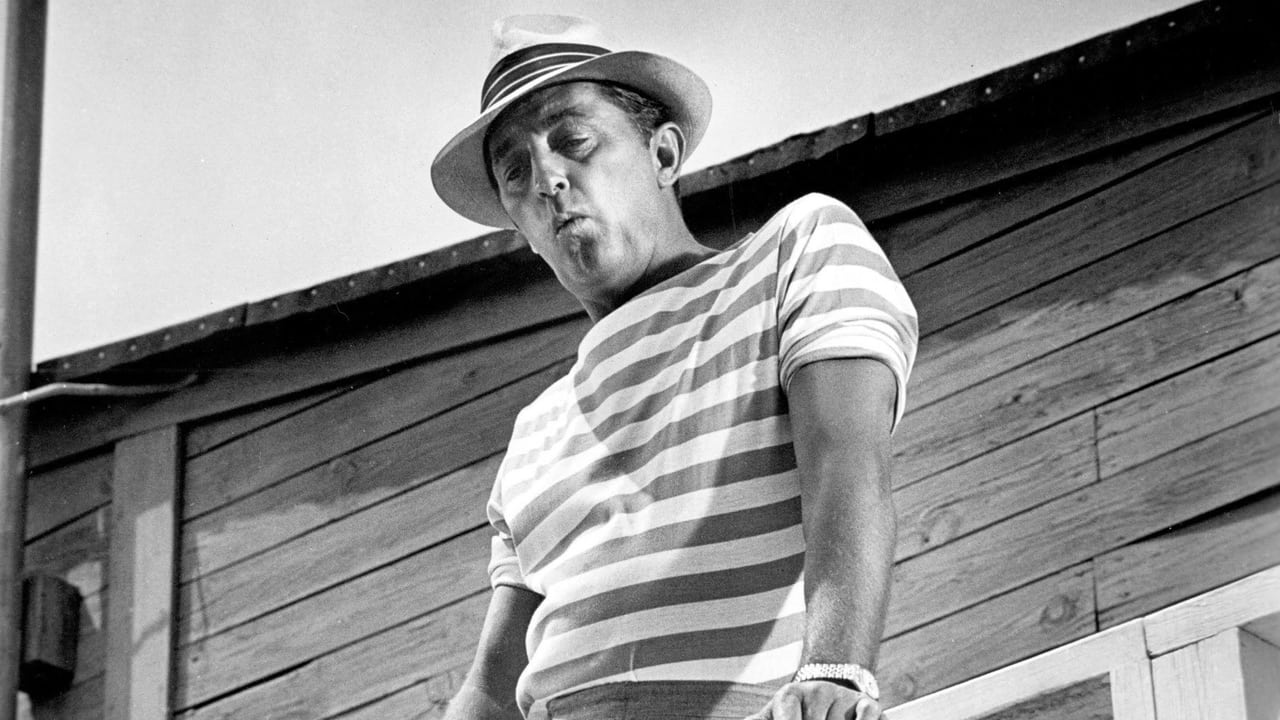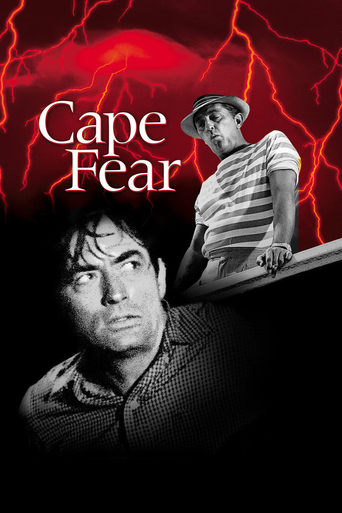

What a beautiful movie!
... View MoreSome things I liked some I did not.
... View MoreFrom my favorite movies..
... View MoreAbsolutely the worst movie.
... View MoreTo be completely honest, I do not know if a movie with themes as sinister and overt as "Cape Fear" could be made in Hollywood today. Yet, amazingly, it was released in 1962, only adding to the creepiness factor of the overall movie experience (I cannot imagine the reaction of theater- goers to this in the early 60s!).For a basic plot summary, "Cape Fear" tells the story of Max Cady (Robert Mitchum), a just- released prisoner who blames lawyer Sam Bowden (Gregory Peck) for his time in the slammer. Thus, Cady decides to hound Sam, wife Peggy (Polly Bergen), and daughter Nancy (Lori Martin), threatening them with a sinister type of violence that only a man with his criminal past can threaten. Cady is careful to work inside the law however, so not even the town police chief (Martin Balsam) or a private investigator (Telly Savalas) can stop him.Without any beating around the bush, this movie is a classic because of Robert Mitchum as Cady. From the first time you see him on screen, you know that he is a slime-ball among the worst of all-time cinema villains. Just the way he swaggers around combined with his accent makes you instantly aware that this is a man to be feared.Of course, that character only truly works against Mr. straight-laced himself, Peck. Though you can read my review for the '91 "Cape Fear" to discover all that was wrong (or average) about that film, the main thing is that they went away from Peck's family representing, well, the innocence of family. In order for Cady to truly strike fear into us, he has to be attacking something we hold dear...that being the notion of family. Sam's family is the epitome of that innocence (shaggy dog, teenage daughter, white picket fence, etc.).The themes in this movie are quite brutal, dealing with violence, rape, pedophilia, and the limitations of the law. Yet, the film is not overtly violent. It is much more of a psychological-type humor, not anything too graphic. That's not saying, however, that you won't be utterly terrified at certain points...because you will.Overall, "Cape Fear" is one of my favorite psychological thrillers of all-time! It has incredible acting, deep suspense, and themes that hold up as well today as they did in 1962. If you have watched the '91 version, you've only gotten the "gist" of things. Watch this for the REAL terror.
... View MoreThe film could easily have been entitled "Harassment." Robert Mitchum steals the show with his cynical portrayal of a man felt that he had been wronged and therefore sentenced to 8 years imprisonment. Upon his release, he begins his harassment of attorney Gregory Peck and Peck's family.The film does bring out the frustration of the justice system in being able to deal with Mitchum's harassment, as it is methodical and for the most part, he is not breaking any law until the violence erupts much later in the film.The usual Gregory Peck is not there. His performance lacked the emotional depth required by a man receiving such torment and yet unable to do something about it. Polly Bergen was terribly miscast as his wife. The emotions shown by her with the exception of the scene where she is attacked is greatly lacking.The ending about turning the tables so that Mitchum should suffer in prison was rewarding.
... View MoreNot the 1991 Martin Scorsese remake, this is the black-and-white original version directed by J. Lee Thompson, the UK practitioner's first Hollywood production at the heels of his whopping adventure THE GUNS OF NAVARONE (1961), which earned him an Oscar nomination. Under the palette of sharp monochrome, it is a four-square good vs. evil battle of wits and guts, law-abiding lawyer Sam Bowden (Peck) would do anything to protect his family, wife Peggy (Bergen) and their 14-year-old daughter Nancy (Martin, an ambivalent impersonation between girl and woman), from the menacing figure Max Cady (Mitchum), an ex-con served 8 years behind the bar, now seeks revenge to Sam, who was the key witness of his conviction. After Cady's blatant re-surface in his hometown, a cautious Sam doesn't waste any time to pull some strings from his friend, police chief Mark Dutton (Balsam), to obstruct Cady in every possible way, which doesn't work out since Cady is a daredevil with enough dough to stay wherever he pleases. A chilling sidebar involving Cady and a loose woman Diane Taylor (Chase, sending up a riveting condemnation of women who are intuitively drawn to a man's sinister allure, over- confidently overlooks all the glaring warning signs) substantiates that Cady is the absolute scourge, amoral, ferocious and beyond any redemption, although his underside is circumspectly circumvented. Interestingly enough, the film engagingly plays up the psychosomatic distress of Sam's family before Cady actually goes full-throttle (except for a venomous dog-poisoning misdeed), a rather incredible episode of Nancy hiding in the suddenly empty school after seeing Cady approaching to her is both eyebrow-raising and absorbing. When the law enforcement fails miserably to forestall Cady's ultimate transgression, Sam turns to private eye Charlie Sievers (Savalas) for keeping a close eye on Cady, and tries futilely to grease the palm of him, until some ineffectual hired thugs really ruffle Cady's feathers. A final face-off would take place in the ominous Cape Fear where Peggy and Nancy are inopportunely deployed as vulnerable decoys, but what if Cady can outguess Sam's moves? Does he have time to save both? Mitchum is a superlative villain, slightly idealized apropos of his omnipotence, he exudes undeniable menace and can haunt you in your worst nightmare, the interrogation scenes between him and Bergen are high-water marks of screen intimidation and capitulation (nice improvisation with the eggs!). Peck is also gung-ho is a less showboating role, a conscientious family man who is press-ganged into going off the beaten path to save the day, scarcely loses his composure until things escalating out of his clutches. Superbly emboldened by a competent cast and its eerily perturbing score from Bernard Hermann, J. Lee Thompson's CAPE FEAR is a top-shelf manipulation of suspense and terror, plus a cri-de- coeur to attest why a restraining order is so requisite in our society, for without it, we are practically defenseless when facing a lurking psychopath.
... View MoreWas this the last film noir type of picture made in B/W? Surely movies have been made in B/W after 1962, but I can't think of anyone in particular this famous. Psycho, for instance, was released in 1960.Anyhow, this is a true gem, and there's nothing that I'd like to add to it, or remove.Robert Mitchum was magnificent in Cape Fear: indeed, he gave life to the odd, inscrutable character of Max Cady. Compare his Max Cady to Lee Marvin's Walker in Point Blank, another impeccable hard boiled 60s thriller (although in color). Marvin's protagonist doesn't really seem to possess any feelings other than Vengeance. Cady shows all kinds of emotion: anger, amusement, hate, self-pity, desire, perhaps even love (though I doubt that). The remake of 1991 is not my favorite, and I suspect that Scorsese simply wanted to cast DeNiro in yet a powerful role. In my opinion, DeNiro didn't make it as Mitchum had already been there. (I also tend to think of DeNiro fans as admirers of greasy Mafiosi clichés: in one scene in the 1991 version, DeNiro's Cady even tuned in some Italian opera while driving his automobile. Not exactly what Mitchum's Cady would have thought of doing...) Cape Fear of 1962 had a sub motive dealing with apparent shortcomings of the law, that even the ex convicts have rights, and so on. The same motive appears later in the Dirty Harry series. Cape Fear of 1991 blurred all this with religion, and much of the point with the setting, copied from the original, was lost. While Mitchum's Cady is believable as the shrewd legal book reading bum, DeNiro's Cady barely appears to be literate.Other reviewers on IMDb have commented on the Hitchcockian style of this thriller. Well, you can see that this was not directed by Hitchcock. No offense intended here, though.
... View More